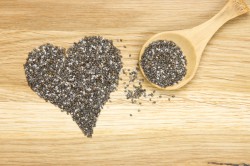 Chia ( Salvia Hispanica) is a flowering plant of the mint family from Mexico and South America, that can sprout in a matter of days. Apparently the 16th-century Aztec Codex Mendoza shows that it was cultivated by the Aztecs in pre-Columbian times and was as important as maize as a food crop.
Chia ( Salvia Hispanica) is a flowering plant of the mint family from Mexico and South America, that can sprout in a matter of days. Apparently the 16th-century Aztec Codex Mendoza shows that it was cultivated by the Aztecs in pre-Columbian times and was as important as maize as a food crop.
“Chia” means oily. The seeds are mottle-colored brown, gray, black and white, about 1mm in diameter and oval. They are crunchy and slightly nutty in flavour, though quickly develop a mucilaginous gel-like coating when soaked as they are hydrophilic, absorbing up to 12 times their weight in liquid, giving the distinctive texture of chia-based beverages.
Nutrition
Chia is consumed for various health benefits especially in maintaining healthy serum lipid level. This effect is due to the phenolic acid and rich Omega-3 fatty acids, including alpha linolenic acid (ALA )and fibre. The flour has a good balance of essential amino acids, yet one study showed deficiencies in lysine. The good water and oil holding capacities, making it useful as an additive in bakery products and food emulsions.
Folklore:
Used as medicinal food to prevent diseases such as diabetes, obesity, and cardiovascular problems.
Research shows:
Studies show possible effectiveness for allergies, angina, athletic performance enhancement, cancer, coronary heart disease (CHD), heart attack, hormonal/endocrine disorders, hyperlipidemia, hypertension, stroke, and vasodilatation. Some evidence also suggests possible anticoagulant, antioxidant, and antiviral effects.
However, the evidence is limited and so far and further studies are needed. One study showed some effect on cardiovascular disease risk factors, another did not. Neither showed effects on weight loss. Its historical use suggests that it is safe for consumption by non-allergic individuals.
Antioxidant
A high concentration of phenolic acids and isoflavones give it antioxidant properties.
Cardiovascular
Alpha-linolenic acid in chia seeds helps to balance the fatty acid profile in the body which helps arteriosclerosis, the cause of coronary heart disease. ALA induces lipid redistribution giving heart and liver protection.
Diabetes
Dietary chia seeds reduced the visceral fat in rats fed a sucrose rich diet to induce dyslipidemia and insulin resistance. A similar study showed prevention of the onset of dyslipidemia and reversal of insulin resistance, though the glycaemia did not change.
Skin
Chia seed oil is a beneficial moisturiser for pruritis and chronic lichen simplex, significantly improving skin hydration.
Sports Performance
Omega 3 chia loading appears a viable option for endurance events lasting more than 90 minutes and allows athletes to decrease their dietary intake of sugar while increasing their intake of Omega 3 fatty acids but offers no performance advantages.
Adding Chia Seeds to your Diet
- Mixed in couscous/rice
- Added to bread or muffin mix
- Sprinkled over salad
- Chia gel – soak seeds in water to form a gel-like substance added to jelly, jam, yoghurt or salad dressing
- Agua fresca de chia – seeds are stirred with water, lime juice and sugar to make a cold drink
 We are happy to advise you on your health matters.
We are happy to advise you on your health matters.
Lin Bridgeford DO KFRP MSCC ICAK (UK) MSc
Registered Osteopath & Kinesiologist & Yoga Teacher
Aether Bios Clinic
Saltdean Brighton
01273 309557
07710 227038
